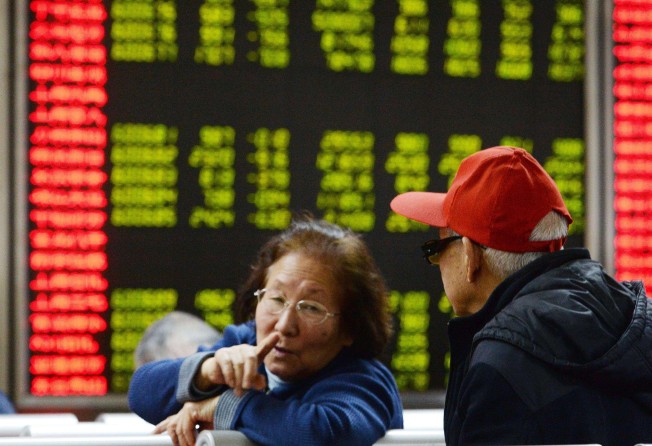Mainland Chinese stocks drop most in over 10 months as traders take profits after Trump rally
Hang Seng Index falls 1.44 per cent as mainland markets tumble

Mainland Chinese markets fell the most in 10 months on Monday as traders took profits after a post-US election rally and ahead of an imminent interest rate increase in the United States.
The Shenzhen Composite Index’s 4.9 per cent drop on Monday was the largest intraday percentage drop since February, when the index fell 5.37 per cent.
The Shanghai Composite Index slipped 2.47 per cent to 3,152.97, the largest one day drop in six months, while the CSI 300 — which tracks large companies listed in Shanghai and Shenzhen — slipped 2.42 per cent.
The Shenzhen Component Index slumped 4.51 per cent to 10,302.85, also its lowest since February, while the Nasdaq style ChiNext was the hardest hit with a 5.50 per cent slide to 1,984.39.
The declines came despite data released on Friday showing a higher-than-expected rise in China’s November producer-price index, which jumped 3.3 per cent, outpacing consumer prices for the first time since 2011.
Capital Link Investment Holdings chairman and chief executive Brett McGonegal said the sell off was due to profit taking after the huge upward momentum that followed president-elect Donald Trump’s surprise election victory last month.
“It’s quite logical to have some pause,” he told the Post. “People are just taking profits.”
McGonegal didn’t think any particular sector brought the market down. “I think it was across the board,” he said.
Hong Kong equities also stumbled on Monday ahead of the US Federal Reserve’s two-day policy board meeting which will wind up on Wednesday this week, shrugging off positive cues in the form of record highs for US markets and surging oil prices.
The Hang Seng Index fell 1.44 per cent to 22,433.02, its biggest intra-day drop in a month, while the Hang Seng China Enterprises Index slipped 1.91 per cent to 9,679.31.
Interest rate sensitive stocks slipped, with HSBC down 1.75 per cent, Ping An losing 1.3 per cent and ICBC falling 1.24 per cent.
Andrew Sullivan, manager of sales trading at Haitong International, said there were a range of factors affecting the market, including slips in Macau stocks last week, China’s crackdown on insurance companies buying equities, the yuan’s continued depreciation, the upcoming Federal Reserve meeting and Trump’s latest comments questioning the long-held US position on “one China”.
Sullivan said this week’s expected interest rate rise was the biggest driver, as it was likely to put the yuan under a lot more pressure due to the strengthening dollar and affect property developers and banks.
“I think there’s a lot of caution,” he told the Post. “People are quite happy to take money off the table.”
The mainland insurance regulator has suspended Evergrande Life’s ability to buy equities, while the yuan reference point was set at 6.9089, lower than Friday’s 6.9072 and approaching the 7 yuan to the dollar level that many analysts expect to come next year.
Markets have been rallying since Trump’s election – and Sullivan noted most rallies don’t end in euphoria. “This rally has been on optimism, there hasn’t been any fact in it yet.”
He expects the market to continue on a downward trend, with more China trade data due out next week seen as a possible “depressing factor”.
Although markets are expecting an interest rate rise at this week’s Fed meeting, investors are still adopting a wait-and-see attitude, according to Kenny Tang, chairman of the Hong Kong Institute of Financial Analysts and Professional Commentators.
Tang said Trump’s latest comments had also created some tension.
While Hong Kong’s market initially rose on higher energy stocks buoyed by a surge in oil prices to their highest level since July 2015, trading ended Monday with losses in all major sectors.
Property developer Henderson Land plunged 2.33 per cent to a 10-day low while Sun Hung Kai Properties was down 2.47 per cent.
Casino stocks continued their retreat after sharp declines on Friday, following a report by the Post about greater restrictions on mainland-issued China Union Pay bank cards, which came into effect Saturday.
Galaxy Entertainment Group dropped 1.43 per cent and Wynn Macau was down 2.29 per cent.
Energy companies saw a silver lining after Saudi Arabia, the world’s largest oil exporter, said on Saturday it would cut production below the target Opec members agreed on last month in order to address persistent global oversupply.
This followed a surprise deal by non-Opec countries including Russia to cut back on oil output next year, the first such agreement in 15 years.
PetroChina led gains among blue chips, jumping 0.55 per cent, while Sinopec Corp increased 0.18 per cent.
Fund flows between Hong Kong and the mainland continue to be weak, one week after the launch of the Shenzhen-Hong Kong stock connect.
Northbound flows reached 10 per cent of the daily quota by the close of trading.
“We need to wait about one month before the buying interest will resume,” Tang said, pointing to similar patterns after the opening of the Shanghai-Hong Kong stock connect.
In Asian trading on Monday, Tokyo’s Nikkei 225 gained 0.84 per cent at 19,155.03. South Korea’s Kospi was up 0.13 per cent, while in Sydney the All Ordinaries was up 0.06 per cent.